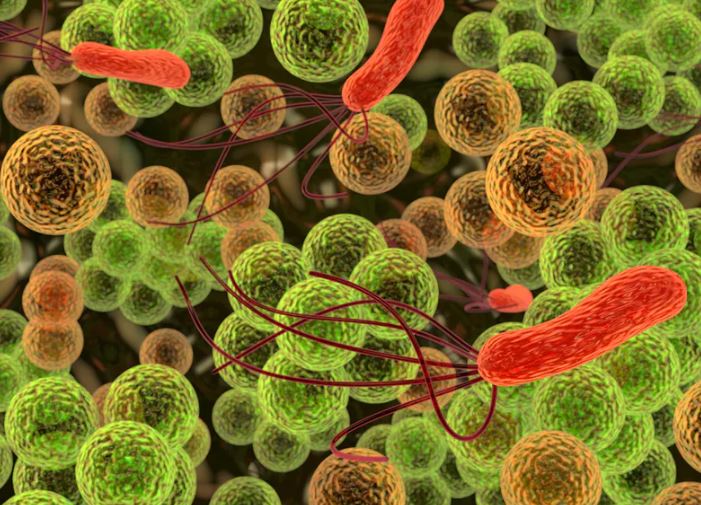More and more research has come out proving how important the microbiome is to your overall health. The microbiome is an amazingly complex system of bacteria that’s unique in each one of us. The majority of the microbiome is located in the gut.
More and more research has come out proving how important the microbiome is to your overall health. The microbiome is anamazingly complex system of bacteria that’s unique in each one of us. The majority of the microbiome is located in the gut. An unhealthy microbiome has been linked to heart disease, cancer, autoimmune diseases, liver disease, neurodegenerative diseases, depression, anxiety, obesity and more. In addition,the health of your gut affects your hormone balance, mood, sleep, metabolism and energy.

There are clinics and hospitals now harvesting bacteria from healthy individuals and transplanting them into patients who are unhealthy. This procedure, known as a fecal transplant, encourages the recipient’s body to grow healthy bacteria. The procedure is being used to improve the health of patients with diabetes, immune conditions and digestive conditions. One study found that a fecal transplant resolved symptoms of IBS in 70 percent of participants. The procedure is even being used to reduce recovery time and side effects for chemotherapy patients.
One of the most widespread and effective uses of a fecal transplant is to restore the balance and health of bacteria in people who have developed recurrence of a bacterial infection known as C. difficile. This infection causes severe colon inflammation and kills about 15,00 people each year in the U.S. Recurrence happens because the same antibiotics used to kill C. diff bacteria also kill healthy bacteria and disrupt the microbiome, allowing the infection to return.Reintroducing healthy bacteria via transplant helps restore patients’ microbiome balance and health.
C. difficile recurrence is an example of what effects antibiotics can have on microbiome health in patients who are already sick. But, antibiotics also have a negative impact on the bacterial health and balance of anyone who takes them – and, unfortunately, they are one of the most overprescribed drugs in our country, so much so that antibiotic resistance has become a major concern for the medical community.
Antibiotics aren’t the only common drugs that adversely affect themicrobiome. A recent study by researchers at the University Medical Center Groningen and the Maastricht University Medical Center looked at 18 drugcategories to determine which ones had the biggest negative effects on the gutmicrobiome. Guess what? The four categories that caused the most damage ar ealso among the most commonly prescribed drugs – you might even be taking one ormore of them now.
They are:
1. Proton pump inhibitors, or PPIs. PPIs such as Prilosec are heavily marketed and available over the counter. Doctors also readily prescribe them for patients with GERD, reflux and indigestion. The recent study found the gut microbiomes of PPI users had higher levels of upper gastrointestinal tract bacteria and increased fatty acid production. Turns out, these medications tha tare supposed to help the gut are actually doing more damage than good.
2. Metformin. This drug is the first-line medication used totreat Type 2 diabetes, especially in overweight patients. The study found thatthose taking Metformin had higher levels of E. coli bacteria, a potentiallyharmful bacteria that can cause severe diarrhea and other intestinal problems.
3. Antibiotics. These drugs are used to treat bacterial infections, but there are a couple of major problems that come with their use.First, they are designed to kill harmful bacteria, but in the process, theyalso kill good bacteria that are crucial to microbiome health. And, doctors frequently prescribe antibiotics for infections that aren’t bacterial, but viral. Antibiotics do nothing for viral infections, but they do harm yourhealthy bacteria.
4. Laxatives. These drugs are used to treat and prevent constipation, but researchers found the medications also wreak havoc on the microbiome. Again, if you’re taking these meds, instead of helping your gut,you’re damaging it.
In addition to these four top offenders to your microbiome health, researchersfound that seven other drug categories were associated with significant changes in bacterial populations in the gut, including SSRI antidepressants and oralsteroids.
"We already know that the efficiency and the toxicity of certain drugs are influenced by the bacterial composition of the gastrointestinal tractand that the gut microbiota has been related to multiple health conditions;therefore, it is crucial to understand which are the consequences of medication use in the gut microbiome," said lead researcher Arnau Vich Vila, from the University Medical Center Groningen.
If you’re taking any of the drugs from these categories, it’s time to stop the damage! It’s also time to stop and question why you need to take these drugs in the first place. After all, you aren’t having health problems due to adeficiency in PPIs, laxatives, Metformin or any other medication. That’s why it’s so important to find a Certified Functional Medicine Practitioner to get to the root causes of your health issues.
At Integrative Wellness Centers, The Top-Rated Naturopathic & Functional Medicine Doctors in Michigan, we use tests that include a highly sensitive DNA stool analysis to assess the microbiome and show what imbalances are occurring. Then, instead of covering up your conditions with more pills, we use supplements and lifestyle changes to restore the body’s health.
Remember, the microbiome affects the whole body in so many ways. That’s why it’s crucial to find a CFMP who knows how to restore your microbiome – and in turn, your whole body – to health.

Take the online digestive evaluation to instantly discover what systems of your body are the cause of your health issues.
Online Digestive EvaluationTake the TestOnline Female Hormone EvaluationOnline Male Hormone Evaluation